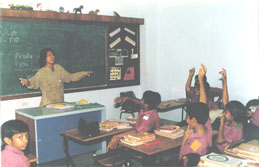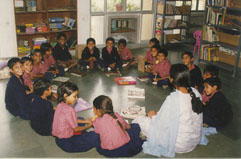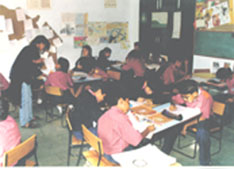
Education prepares for life, and academics are an important part of that preparation. In a competitive environment, good academic performance is needed for admission to higher education. However, skills like analytical reasoning and verbal proficiency as well as habits like hard work, application and perseverance are developed through an effective programme. These are more important than mere admission to college.

Child Development Principles
Modern brain development theories confirm that children have an incredible ability to learn. The key is to provide them exposure to a variety of inputs (language, technology, arts) at an early age, and to allow them to develop a taste in their particular area of interest.
How children learn best changes with age; so does what they can learn. This ability to appreciate abstract concepts, for example, develops only by the age of 11 – 12. This is the basis of curriculum development for different classes at Eklavya School.

Academic Philosophy
Middle school deals with students of classes 5 to 8, the age group from 10 to 13. This is an age where children undergo remarkable changes both physically and psychologically. It is the ideal time to introduce them to a wider range of subjects and a varied choice in sports and activities.
Students are exposed to different subjects and the teaching methodology involves more of experimentation and learning through experience.
Overhead projectors, teaching learning materials, exposure to the world of books, magazines, periodicals in the library and projects are used by Educators extensively to enhance and enrich the learning process.
Interactive mothers workshops are another feature, which improve rapport between parents, educators and students. This is the age when parents need to work hard to form study habits, character formation as well as imbibe values, which are crucial for the child’s career shaping and future. Mothers workshop provides a platform for parents to exchange and share their individual experiences with other parents for better understanding of the adolescent psychology and the school curriculum.
The adolescent child is eager to explore and discover his talents, skills and his strengths. Middle school gives him the opportunity to select the sport and activity of his choice and pursue it. This develops his confidence and decision making capacity.
Middle school provides the right balance of academics, sports, activities and personality development. The child now takes his first step towards adulthood.
A student enters middle school as a playful and curious child in the fifth standard and emerges from 8th standard as a responsible, confident and focused student ready to step into the serious world of academics in senior school.